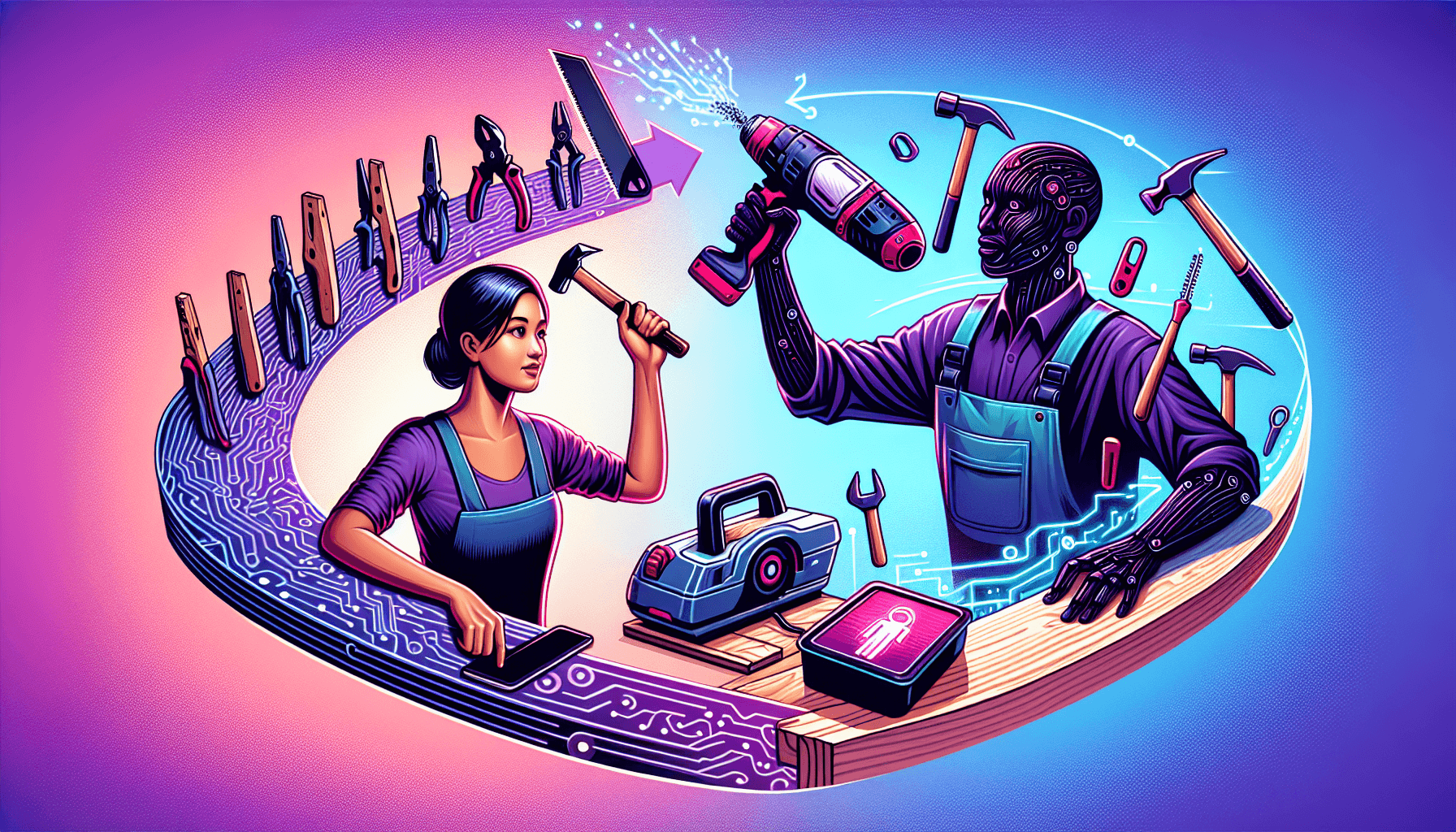
AI in Web Development: Evolution, Not Revolution
AI is not here to replace developers—it's a tool that amplifies their capabilities, just as power tools revolutionized carpentry. Discover why embracing AI is the next step in the natural evolution of web development.
The Tool Evolution: From Hammers to AI
Throughout human history, every new tool has sparked both excitement and fear. When electric saws first arrived in carpentry workshops, some craftsmen worried they would lose their jobs. When automobiles replaced horse-drawn carriages, coachmen protested. Yet today, we recognize these innovations not as job destroyers, but as tools that made skilled workers more productive and capable.
Artificial Intelligence in web development is following the same trajectory. It's not here to replace developers—it's here to amplify their capabilities, just as an electric saw amplifies a carpenter's ability to cut wood precisely and efficiently.
What AI Can't Do (Yet)
Let's be clear: AI cannot replace the human elements that make great web applications exceptional. Here's what still requires human expertise:
- Understanding Business Context: AI doesn't understand your client's unique business challenges, industry regulations, or competitive landscape. That requires human insight and experience.
- Creative Problem-Solving: When faced with unusual requirements or edge cases, AI often provides generic solutions. Developers bring creativity and innovation to solve complex, novel problems.
- User Experience Design: While AI can generate layouts, it cannot truly understand human psychology, cultural nuances, or the emotional journey users take through an application.
- Strategic Architecture Decisions: Choosing the right tech stack, scalability approach, and system architecture requires weighing trade-offs that AI simply cannot evaluate without human guidance.
- Quality Assurance: AI can write tests, but experienced developers understand which scenarios are most critical to test and what edge cases to watch for based on real-world experience.
What AI Does Exceptionally Well
Like any good tool, AI excels at specific tasks that would otherwise be time-consuming and repetitive:
- Boilerplate Code Generation: Why spend 30 minutes writing CRUD operations when AI can generate them in seconds? This frees developers to focus on complex business logic.
- Code Documentation: AI can quickly document functions, classes, and APIs, ensuring codebases remain maintainable without the tedious manual work.
- Bug Detection: AI-powered linters and code analyzers can catch potential issues before they reach production, acting as a tireless second pair of eyes.
- Rapid Prototyping: Need to quickly test a concept? AI can generate prototype code to validate ideas before investing in full development.
- Learning & Reference: New framework or API? AI can provide instant examples and explanations, accelerating the learning curve.
The Carpenter's Analogy
Consider a master carpenter. They don't fear power tools—they embrace them. An electric saw doesn't make them obsolete; it allows them to focus on joinery, finishing, and design rather than spending hours sawing by hand. The carpenter's value lies in their knowledge of wood, their understanding of structure, and their ability to envision and execute beautiful, functional pieces.
Similarly, AI doesn't diminish a developer's value. It handles the repetitive "sawing" while developers focus on architecture, user experience, security, performance optimization, and solving unique business problems. The developer's expertise becomes more valuable, not less, because they can now accomplish more in less time.
Embracing the Evolution
Fear of new technology is natural, but history shows us that resisting tool evolution ultimately holds us back. Imagine if society had rejected automobiles because of concerns about horses becoming obsolete, or if carpenters had refused electric tools to "protect their craft." We'd be living in a much less efficient, less innovative world.
The developers who will thrive in the coming years aren't those who reject AI—they're the ones who learn to wield it effectively. They understand that AI is a tool in their toolbox, not a replacement for their brain, creativity, or experience.
The Future is Collaborative
The future of web development isn't humans or AI—it's humans and AI working together. Developers will prompt AI to generate code, then review, refine, and integrate it into larger systems. They'll use AI to handle mundane tasks while spending more time on strategic thinking, user research, and crafting exceptional experiences.
This collaboration will lead to:
- Faster development cycles
- More innovative solutions to complex problems
- Higher quality code with fewer bugs
- More accessible web development for smaller businesses
- Developers with more time to focus on what truly matters: creating value for users
Conclusion: Tools Make Us Stronger
We don't ride horses to work anymore, and we don't hand-saw every piece of lumber. These aren't losses—they're gains. They're evidence of human progress and our ability to build better tools that amplify our capabilities.
AI in web development is the next step in that evolution. It's a powerful tool that, when wielded by skilled developers, creates better websites, better applications, and better digital experiences for everyone. The question isn't whether to embrace AI—it's how quickly you can learn to use it effectively.
After all, the best carpenters aren't those who refuse power tools—they're those who know exactly when and how to use them.